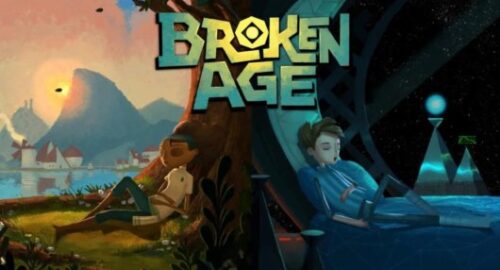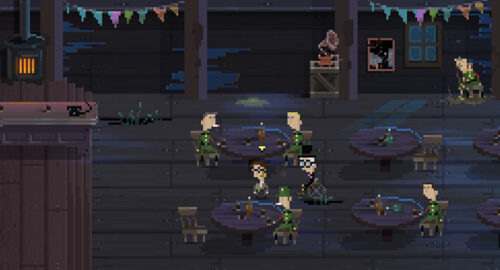NOTE: This article contains plot spoilers for The Walking Dead: Season 2 video game.
The dark pitfalls in Clementine’s survival story over the past four episodes of The Walking Dead: Season Two have left some trepidation about how her story will end; the lack of clarity in the plot’s direction has been a little unfulfilling. Thankfully, Telltale Games have rounded off this season with an episode that swells with a steadily rising tension that is helped greatly by the power of some of the endings on offer.
• Developer: Telltale Games
• Publisher: Telltale Games
• Reviewed on: PC
• Also Available On: Mac, Xbox 360, PlayStation 3, iOS, Vita
• Release Date: Available Now

Episode Four‘s cliffhanger left Clementine and co. facing the armed threat of a group of bandits, which involved some haywire bullets and Alvin Junior – Rebecca’s newborn – having a fairly distressful first start in life. After some injuries are procured and the group are relatively safe, they have little choice but to follow Arvo, the nervous youngster who tricked them into the confrontation. With the added complication of a newborn, the constant search for food and shelter now becomes imperative.
A great deal remains unchanged in this episode compared to previous – basic survival is still the fundamental (if tedious) goal, yet fortunately tenser moments feel more relevant in this finale as there are constant signs of build-up to a dark confrontation. This is mostly due to attention paid to a minority of characters. Kenny is integral to this episode, arguably more so than any other character, and his growing heedlessness is the cause of the growing strain.
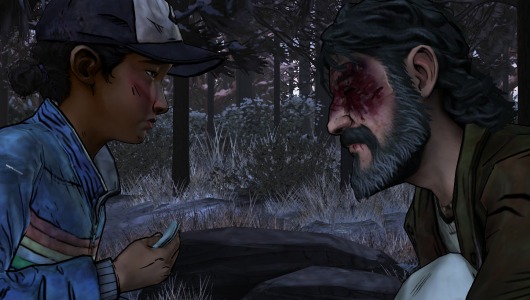
I’ve mentioned in previous reviews of this season that the character development is skewed; characters like Alvin, Rebecca and even Luke are undeveloped and attention is directed only on a select few, making casualties less impacting than we’d expect of The Walking Dead. In this finale, we understand why – the episode is dominated by Kenny and Jane, the characters closest to Clementine and whose back-stories and nature we have learned the most about. Their close relationship with Clementine means taking sides during their clashes, and thankfully, the difficult decision-making that has largely been missed in this season has been restored.
With weighty dialogue options returning and new complications added to the mix, it’s good to see realistic obstacles beyond the broader survival goals. Subtler threats like environmental changes are an interesting addition, emphasised by the wintry sound effects that darken the chilly mood. When Arvo leads them to an unfinished yet abandoned house beside a frozen lake, the simple comfort of a crackling fire isn’t enough to block out the muted wind. Even Clem’s warm jacket, a gift from Bonnie, can’t do much against the whistling cold; some storms can’t be halted, a fact very evident in this finale. Like any good horror story, these sounds intensify the gloom.
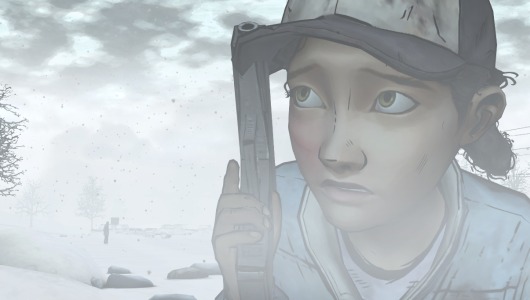
There are three points in this episode at which I thought: that’s the end. That speaks well for the writing and the shock-inducing events that seem fatal to Clementine. Like any true protagonist, there’s no lenience due to her youth or vulnerability – she is at risk just as much as anyone could be in The Walking Dead‘s story, and threats to her life serve to reveal the desperation of other survivors. Season One of this game served to display the spreading disaster of the Walker threat, the loss of loved ones to the blight and the first steps towards preserving what little is left. Season Two has moved on from this; there is less immediacy as time has progressed, and questions of survival in the long-term have been raised. There’s proof in Episode Three with Carver’s regime; even rumours of there being a colony in Wellington suggests there is organisation for more permanent protection. The theme is endurance through devastating crisis, and the way people deal with it differently has made for a much darker story than we saw in Season One, and the inevitable confrontation in Episode Five only confirms this.
Season Two may not have got it consistently right, but Telltale Games know how to do endings. Or at least, it knows how to provide heartbreaking closure if you go down that path; if not, there’s an entirely different, more open-ended option possible. As I mentioned before, the significance of the decisions you make in this episode feel much weightier, far more so than previous episodes and the finale is the strongest example of this. Not only are the deciding decisions difficult and uncomfortable to make, you are forced to choose between the two most developed characters in the game – and the two most valuable to Clementine. This showdown is potentially the darkest point we’ve seen the story sink, and not only is it hard enough to resolve, your ‘moral’ decision may not have been such. The lesson Clementine learns afterwards could be harder still – perceptions of morality can be skewed, and thinking you are choosing the ‘right’ option can be totally wrong when you’re unknowingly being misled by someone else.
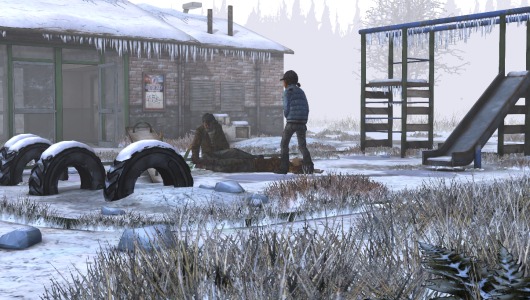
Unlike in Season One’s finale, in which Lee’s death had a sense of inevitability, Season Two has an unpredictability that lasts until the end; and the choices you make really do change the outcome of Clementine’s journey. Five different endings provide great variety – Clementine can end up with one of two different characters or close the episode solo (with Alvin Junior along for the ride). She can find closure in long-term safety, or face a more uncertain future. My final decision was in the minority, the option only 16.6% of players (at that point) had chosen. This greatly surprised me. I’m definitely the sort of player that gets thoroughly invested in characters I appreciate, and the ending I gained was exceptionally powerful and offered true finality that I was satisfied (if shamelessly tearful) over. After viewing the other four endings, I stick by my choice; whilst it’s great that any kind of player can influence the narrative in the way they deem fit, the brilliance of the Kenny and Clementine ending is that it holds such poignancy it potentially surpasses the emotional power of Season One’s finale. It suits this season’s tone brilliantly as this character shows parts of his nature have remained unchanged after all; he is willing to sacrifice his safety in favour of Clementine and Alvin Junior’s, in a heart-wrenching show of protection.
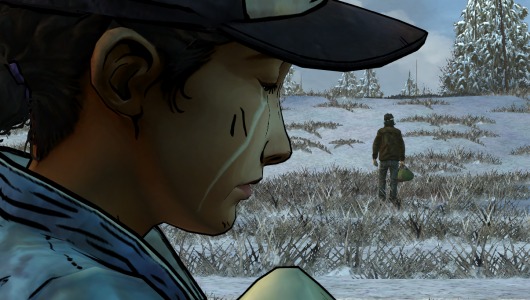
The finale is a recipe of everything The Walking Dead needs to evoke the emotion it has become so popular for, and whilst there have been elements lacking along the way the climactic collection of scenes in No Going Back have redeemed this season. I would definitely recommend playing through each ending on offer to appreciate the impact your decision-making will have in resolving Clementine’s journey in The Walking Dead: Season Two.



